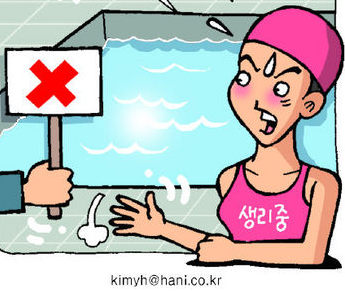 |
Asked to not use pool during menstruation, women pay same fees as men but get less time
Song Chu-hyang, a 28-year-old female office worker, joined a swimming pool in Jongno, downtown Seoul. The fee is 100,000 won (US$115) a month, but a few days after she joined, she began her menstrual period. She asked the swimming pool whether or not she could refund some of the fee or get an extension on her registration period, but she was denied. She then asked if she could use the pool during her menstrual period, but she was again rejected. Song paid the same amount as male members, but she lost a whole week out of the month. She stopped swimming there after her first month.
People have become increasingly aware of the importance of health and exercise, but there are few sports facilities that consider the needs of female members.
The Social Invention Center of the Hope Institute, a civic organization, and The Hankyoreh surveyed 10 famous sports centers in Seoul and the surrounding areas and found that there was not a single place which compensated female members for the time they are unable to swim. It is the same for swimming pools operated by provincial governments, and most swimming pools demand female members not to enter the pool during their menstrual period.
Such a lack of regulation for compensating female members for missing pool time is due to a general societal conception that menstruation is women's ``personal matter.'' There are regulations for refunding those that cancel membership midway through their contract, but it is impossible to force those sports centers to extend the registration duration [for women], according to Jo Saet-byeol, an official of the Consumer Protection Board. ``As of now, there are no special measures unless the related parties reach an agreement,'' explained Jo.
However, many people point out that, considering the ability for women to take menstruation leave has been widely accepted by the nation, there should be other policy changes. An Jin-geol of the Social Invention Center, said, ``Under current regulations on compensating consumers for their damages, consumers are to blame for non-participation due to menstruation. Therefore, there are no ways for them to get compensation.'' An stressed that it was wrong to blame consumers for physiological phenomena. The Hope Institute plans to urge the government to take measures to compensate women affected by this situation. Please direct questions or comments to [englishhani@hani.co.kr]





